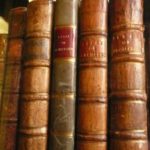 Secondary Sources: Secondary sources are less easily defined than primary sources. Generally, they are accounts written after the fact with the benefit of hindsight. They are interpretations and evaluations of primary sources. Secondary sources are not evidence, but rather commentary on and discussion of evidence. However, what some define as a secondary source, others define as a tertiary source. Context is everything.
Secondary Sources: Secondary sources are less easily defined than primary sources. Generally, they are accounts written after the fact with the benefit of hindsight. They are interpretations and evaluations of primary sources. Secondary sources are not evidence, but rather commentary on and discussion of evidence. However, what some define as a secondary source, others define as a tertiary source. Context is everything.
from http://www.lib.umd.edu/tl/guides/primary-sources accessed 9/15/2014
Where possible we have linked to free sources: Project Gutenberg, Google Scholar, anywhere we can find a free version that you could read or possibly download. For a couple we have only found partial free versions, or free versions only through JSTOR, which is an academic paid-subscription database. If you are a university student, or work at a university, you probably have access. If you’re not, find someone who is and ask very nicely…
If you don’t have any other book on SCA-period recipes, get this one:
A Sip Through Time: A collection of old brewing recipes. Cindy Renfrow. 1994, 1997. Published by the author, Sussex, New Jersey, 1994.” ISBN 0-9628598-3-4
Primary sources: Primary sources are original materials. They are from the time period involved and have not been filtered through interpretation or evaluation. Primary sources are original materials on which other research is based. They are usually the first formal appearance of results in physical, print or electronic format. They present original thinking, report a discovery, or share new information.
from http://www.lib.umd.edu/tl/guides/primary-sources accessed 9/15/2014
A couple of the books below were published after 1600. It is generally accepted that the recipes themselves were collected and date before 1600.
Some places to find great primary sources on brewing: Google Books, Googls Scholar, Gutenberg Project, your local University library – and other medievally-minded brewers!
Some basic period-appropriate books we all reference:
Curye on Inglysch (Middle English recipes) (Early English Text Society Supplementary Series). Hieatt, Constance B., and Sharon Butler. Early English Text Society. Second Series 8. London: Oxford UP, 1985. JSTOR allows you to read online for free but charges for downloads.
The Closet of the Eminently Learned Sir Kenelme Digbie Kt. Opened: Whereby is Discovered Several ways for making of Metheglin, Sider, Cherry-Wie, &c. Together with Excellent Directions for Cookery As also for Preserving, Conserving, Candying, &c. Digbie, Sir Kenelme (1669). H. Brome, London. Reproduced by the Mallinckrodt Chemical Works, 1967. Available through Project Gutenberg, which has .html, Kindle, .ePub, plain text, and other versions.
Delightes for Ladies Plat, Sir Hugh. Humfrey Lowens, London, 1602. London: Crosby Lockwood & Sons, Ltd., 1948. Available through Gutenberg, text directly from Elizabethan manuscript.
The Domostroi: Rules for Russian Households In The Time Of Ivan the Terrible. Pouncy, Carolyn Johnston (1995). Cornell University Press, New York. Google has it in several editions, so this link is to the search page so you can make your own choice.
The English Housewife Markham, Gervase, 1615. Best, Michael R., ed. McGill-Queen’ s University Press, 1986, 1998, 2003; ISBN10 0773511032,
ISBN13 9780773511033 Linked to Google Books.
The English Husbandman The First Part: Contayning the Knowledge of the true Nature of euery Soyle within this Kingdome: how to Plow it; and the manner of the Plough, and other Instruments Produced by Louise Pryor, Jonathan Ingram and the Online Distributed Proofreading Team at http://www.pgdp.net. Multiple versions on Project Gutenberg. Has chapter on managing a hop garden.
The Jewel House of Art and Nature, Containing Divers Rare and Profitable Inventions, Together with Sundry New Experiments in the Art of Husbandry : with Divers Chimical Conclusions Concerning the Art of Distillation, and the Rare Practises and Uses Thereof. Plat, Sir Hugh. Manuscript available through Google Scholar.
Le Ménagier de Paris, or The Goodwife’s Guide. Trans. Greco, Gina L. and Rose, Christine M. Cornell University Press; First Edition 2009. ISBN-10: 0801474744; ISBN-13: 978-0801474743 . You have to have JSTOR access – usually via a university – you can check with friends who are students or work at one.
Martha Washington’s Booke of Cookery Hess, Karen, ed. New York: Columbia University Press, 1981, 1995; ISBN10 0231049315, ISBN13 9780231049313. This is a partial view only, it doesn’t include all the pages.
Pleyn Delit: Medieval Cookery for Modern Cooks. Hieatt, Constance; Hosington, Brenda; and Butler, Sharon (2004). University of Toronto Press, Toronto, Canada. You have to have a JSTOR account, usually via a university – you can check with friends who students or work at one.
(In a bit of shameless self-promotion, there are longer lists at Sorcha’s own brewing blog. Go to http://www.elspethpayne.com and search on “Books for Brewers”, where there are lists for primary and secondary sources, modern brewing books and books on honey and beekeeping. Or, go directly to (primary) http://www.elspethpayne.com/2012/06/21/historical-primary-sources-for-brewers/ or (secondary) http://www.elspethpayne.com/2012/06/21/historical-brewing-secondary-sources/)